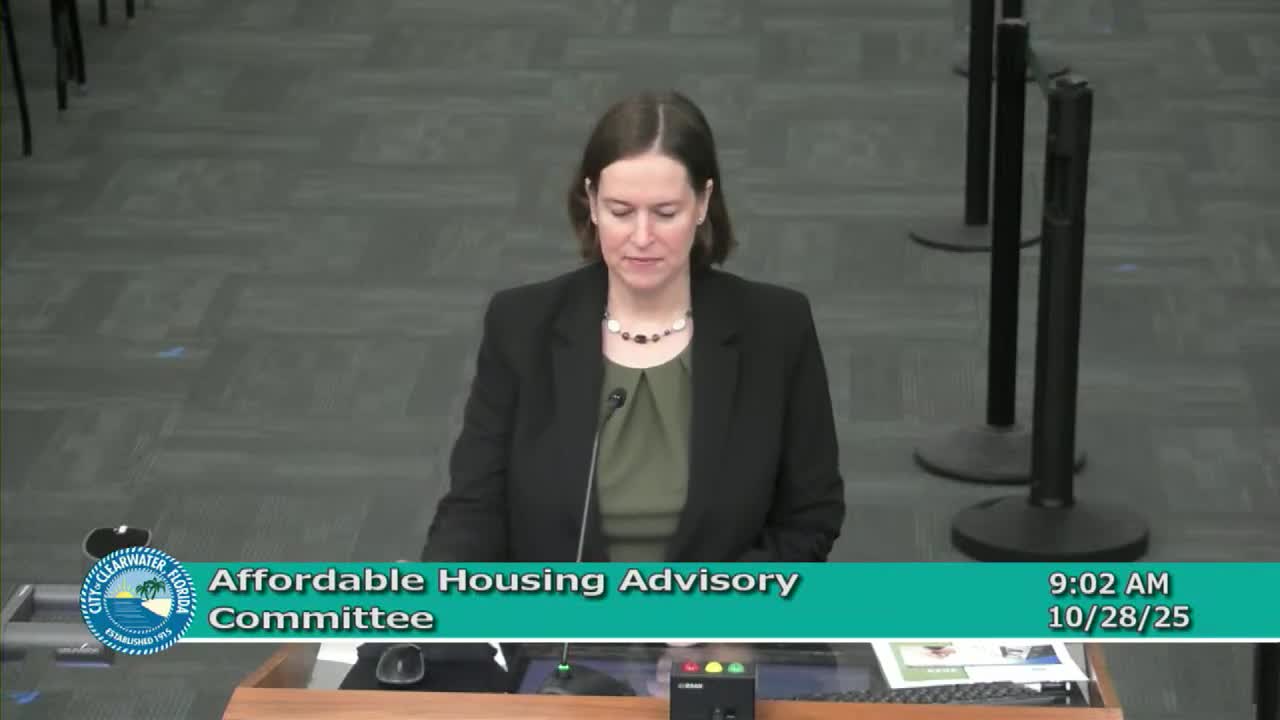Clearwater AHAC advances LHIS draft, adds single‑family and ADUs to expedited permitting
Get AI-powered insights, summaries, and transcripts
Subscribe
Summary
The Affordable Housing Advisory Committee on Oct. 28, 2025 reviewed and revised the draft Local Housing Incentive Strategy (LHIS), confirming the schedule to present the document to the City Council on Dec. 4 and to submit it to the Florida Housing Finance Corporation by Dec. 31, 2025.
The Affordable Housing Advisory Committee on Oct. 28, 2025 reviewed and revised the draft Local Housing Incentive Strategy (LHIS), confirming the schedule to present the document to the City Council on Dec. 4 and to submit it to the Florida Housing Finance Corporation by Dec. 31, 2025.
The committee kept most recommendations from the 2024 LHIS in place but approved several clarifications and minor edits for the Nov. 18 public hearing. Among the changes, staff and members agreed to add single‑family homes and accessory dwelling units (ADUs) to the city's expedited permitting pathway for certified affordable housing projects; delayed publication of a mentor/developer list from 2025 to 2026; and added a direction to point developers and members of the public to the city's affordable housing web page as the primary starting resource.
Amanda Warner of consultant firm Wade Trim, who led the session, reiterated the near‑term timeline for the LHIS: "After this meeting, the next meeting will be a public hearing," and said the packet will go to City Council on Dec. 4 with a state submittal due Dec. 31. Warner summarized that the draft addresses the 11 incentive areas required by Florida statute and five AHAC‑initiated items, for 16 incentive areas total.
Planning and Development Director Lauren Matzke provided permit processing data to support adjustments to expedited review. "Our first reviews were completed between 4 and 8 business days," Matzke said of tracked affordable projects, and she noted one larger Cleveland Street project had a 31‑day first review with subsequent re‑reviews averaging about six days. Matzke also told the committee that "impact fees are not allowed to be waived," explaining the city can instead pursue reductions or subsidies through other funding sources.
Committee members discussed operational details for expedited processing. Staff said the city's intake team can manually override automated review dates when an applicant submits a signed certification that a project includes affordable units, which moves that application earlier in reviewer work lists. AHAC agreed to amend the expedited‑review recommendation to explicitly include single‑family units and ADUs when those units are documented as affordable.
On fees, staff reported the city has already reduced permitting fees for affordable housing projects by about 75 percent. Warner said forward‑looking work includes a Forward Pinellas multimodal impact fee study and a separate City fee study tentatively planned for 2026. Dylan Mayhew noted a board‑directed subsidy fund is available to offset permit and impact fees; "I think in that fund, we have around 230,000," he said.
The committee examined other incentive areas in the LHIS and largely voted to continue existing recommendations: maintain density flexibility (including the Live Local Act incentives and the city's affordable housing bonus), continue to allow ADUs in multiple zoning districts, retain flexible parking and lot‑configuration rules tied to context and transit proximity, and keep the city's inventory of publicly owned lands available to developers. The AHAC also removed an obsolete reference to the "senior executive team" and confirmed the interdepartmental review process now occurs between Economic Development & Housing and Planning & Development.
Members raised two recurring caveats. First, staff noted statutory limits set by recent state legislation (discussed in the meeting as Senate Bill 180) constrain the city's ability to impose new requirements that could be read as more restrictive; staff said some incentive tools may require more study or a different legal approach. Second, while committee members asked about an ADU rental rebate, staff said monitoring and compliance would be difficult without a dedicated funding source and that rebates are not being pursued at this time.
No members of the public spoke on the item and no emailed comments were received. The AHAC scheduled a public hearing on the LHIS for Nov. 18 at 9 a.m. in council chambers; the committee will review the draft one more time before the packet goes to City Council on Dec. 4.
Meeting decisions recorded at the session included approval of the Oct. 14 minutes by voice vote and a committee consensus to move the mentor‑list completion date to 2026. Several recommendations in the draft were recorded as "continued" or "modified" pending the Nov. 18 public hearing.
What remains open: staff and consultants will incorporate the minor edits discussed at the Oct. 28 workshop and prepare the formal LHIS packet for the Nov. 18 public hearing; a city fee study is planned for 2026; and staff will continue coordination with Forward Pinellas and Pinellas County on impact‑fee work and the public lands inventory.
